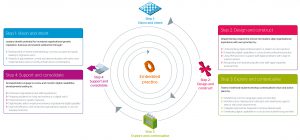Technological change and evolving digital capabilities – how can we keep up?
Digital know-how (Beetham, 2015) is an acknowledged asset to our future economy (House of Lords select committee on digital skills, 2015) that is changing the way we work, communicate and conduct our personal business. The sustained rate of growth in digital innovation and creativity offers what seems like a limitless array of new opportunities and discoveries but also raises a few challenges (Ecorys UK, 2016) – how can we keep up with changing demands and rapidly changing skills sets?
Starting the conversation: building the digital capability community
Our understanding of what it means to be digitally capable continues to evolve – it is not a static thing and will mean different things to different people at various stages of their academic and working lives. One of the key messages from the case studies Journeys towards digital capabilities is how important it is for organisations and teams to explore frameworks and models and use these as conversation starters to establish shared understanding and a common vocabulary.
It is therefore very timely that this week sees the inaugural meeting of the digital capability community of practice for those responsible for developing digital capability in their organisations. The aim is to engage community members in co-creating resources, sharing knowledge and experiences.
Although the event is fully-booked, those unable to attend can join the discussion on Twitter at #digitalcapability @jisc as well as join the digital capability mailing list.
New guide: Developing organisational approaches to digital capability
If you have read recent posts on this blog by Helen Beetham and Sarah Knight you will be aware that Jisc has recently released a collection of new resources designed to support you to develop digital capabilities in your organisation. These include a briefing paper, an updated framework of digital capabilities, a series of digital capability role profiles (some linked to professional association requirements), an audit tool and checklist, a curriculum design checklist together with 14 new case studies from both Higher and Further education providers.
Jisc’s new guide to Developing organisational approaches to digital capability launched last week provides a structured route through these new and updated resources which we hope will be of value to those starting out as well as supporting those already working in this field with an approach based on the experience of others.
Why the focus on organisational approaches?
The guide specifically focuses on organisational approaches because the identity, culture and infrastructure of an institution have a significant impact on the extent to which digital practices are facilitated and, in turn, determines how enabled individuals feel in developing their own skills, knowledge and practices.
“When we were looking at the Digital Lancaster strategy [we considered] whether people would have the skills to undertake what we were expecting, and above and beyond that, did they have a culture that encouraged them to actually do it?”
Rachel Fligelstone, head of service, strategy and communications, Lancaster University.
Looking beyond individual capabilities: The digitally capable organisation
In addition to the recently updated digital capabilities framework for individuals we have introduced a new model that articulates what the digitally capable organisation might look like. It is similar in design and structure to the individual framework but looks beyond the capabilities of individuals and acknowledges the importance of taking a strategic approach, the impact of organisational culture and infrastructure and the role of digital capabilities and their impact on, and relevance to, all areas of university and college business.
Strategic steps towards digital capability
Based on the experiences and lessons learned from a diverse range of case study contributors, the guide also includes a customisable 4-step model which suggests practical activities designed to help you build a contextualised model appropriate to your needs.
Keeping the conversation going
The resources and outputs from the digital capability community event and any other relevant research and information will be posted to this blog site. Follow #digitalcapability @jisc on Twitter and join the digital capability mailing list to continue discussions and share your ideas.


One reply on “Launch of new digital capability community and new guide to developing organisational approaches to digital capability”
I am amazed at the work that has been done in this project. The material is really useful. As a newly appointed Digital Literacy Teacher at our FE equivalent here in Australia, I have been appointed to create a Digital Literacy Assessment tool to assess the capabilities of the staff.
As an international I do not fall under the JISC membership criteria, however I am really interested in following the project closely. I found the Discovery Tool for Digital Capabilities has a really useful approach, however the tool I am required to create needs to have a formal test element, whereas, the discovery tool uses a self assessment approach. I found that I underestimate my abilities in a survey type analysis, where as my colleague was more inclined to overestimate her skills.
I was amazed that you were able to break down the capabilities to only 52 questions.